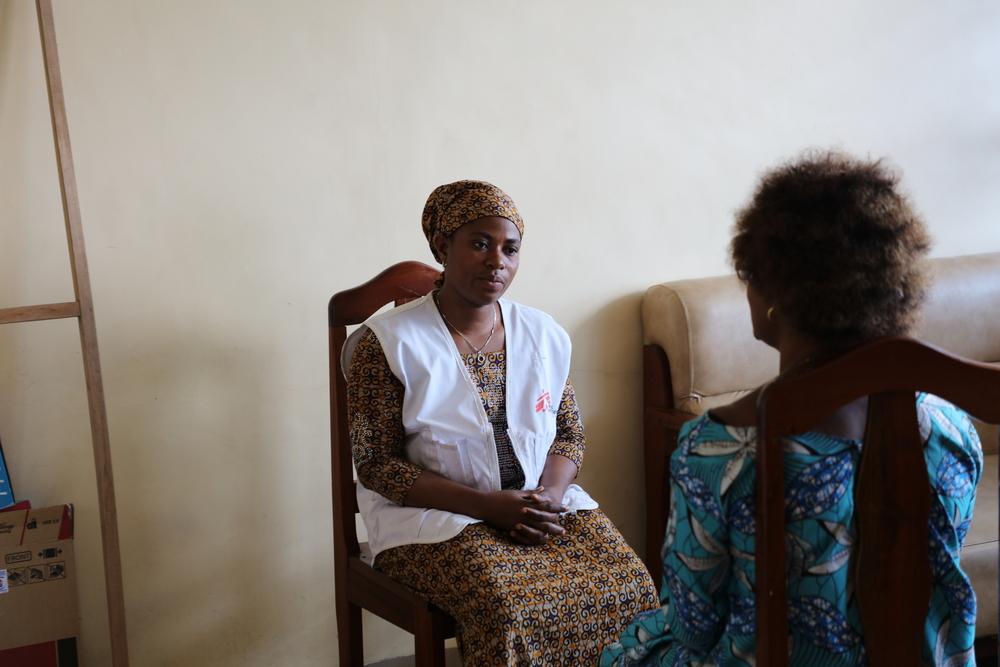Nicole [not her real name] has been living with HIV for years. The widowed mother of two is raising her children alone. Every day, she needs to take antiretroviral (ARV) treatment to keep her condition stable.
“My treatment is free, but I don't have money to buy food for my children and me,” she says. “How can I take medicines every day without anything to eat?”
Like Nicole, many people living with HIV in Goma, North Kivu, face socioeconomic difficulties that prevent them from following their treatment properly, despite the free medical care provided by Médecins Sans Frontières/Doctors Without Borders (MSF). Stigmatisation, social exclusion and poverty are all realities that can push some patients to stop taking their treatment. These challenges can also be acute for survivors of sexual violence, street children and sex workers, who are often particularly vulnerable and marginalised in DRC.
Holistic approach
Since March 2022, an MSF team has been providing psychosocial support in seven health facilities in Goma(Virunga general hospital, military hospital, Heal Africa hospital, Kahembe reference health centre, Murara health centre, CLCK and Caramel health centre.) to complement patients’ medical care and provide them with holistic support. The team consists of a psychologist and three social workers. They carry out in-depth individual interviews with the most vulnerable patients to identify psychological and socioeconomic difficulties that could have negative consequences on their medical treatment.
"Nowadays, as long as you take your medication regularly, a person infected with HIV can live a normal life,” says Justin Sadiki, MSF's patient support supervisor in Goma. “However, we still see several treatment failures as a result of poor adherence to treatment. When you dig to understand the reasons behind it, you often realise that the cause of their non-adherence is not medical."
Logistical and financial constraints, such as the cost of travel to a health facility, as well as psychological vulnerability and a lack of stable housing for instance can hamper the smooth course of patients’ treatment. "We look into these obstacles and try, together with the patient, to find ways to overcome them, with the ultimate goal to improve his or her medical care," says Sadiki.
Between March and May 2022, more than 100 people received psychosocial support from the MSF team in Goma, including 60 people living with HIV and nearly 40 street children.
"Before, I didn't know who to confide to,” says Nicole. “I have many problems: I am HIV-positive, a widow and I have no means of support. It's a relief to talk to the team."
Building bridges
As well as providing direct psychological support to patients, MSF works with other organisations in Goma, including the Division of Social Affairs and community and civil society organisations, to help find tailored solutions to the challenges faced by patients. This might involve linking patients with organisations that offer vocational training or legal support or referring them to a facility that provides accommodation.
"As a medical organisation, we cannot respond to all the needs,” says Sadiki. “We act as a bridge, supporting the patients to identify their own difficulties and solutions. Then, if necessary, we refer them to an organisation that can help them according to their specific needs. For each person, the problem and the response will be different. There is no one-size-fits-all solution."
Since 2015, MSF has been supporting people living with HIV/AIDS in Goma, North Kivu. MSF teams support seven health facilities to offer free, quality care to patients living with HIV in the health zones of Karisimbi and Goma. More than 4,300 patients are currently under treatment. In 2019, MSF expanded its activities to increase access to basic healthcare for survivors of sexual violence, sex workers and street children in Goma.
